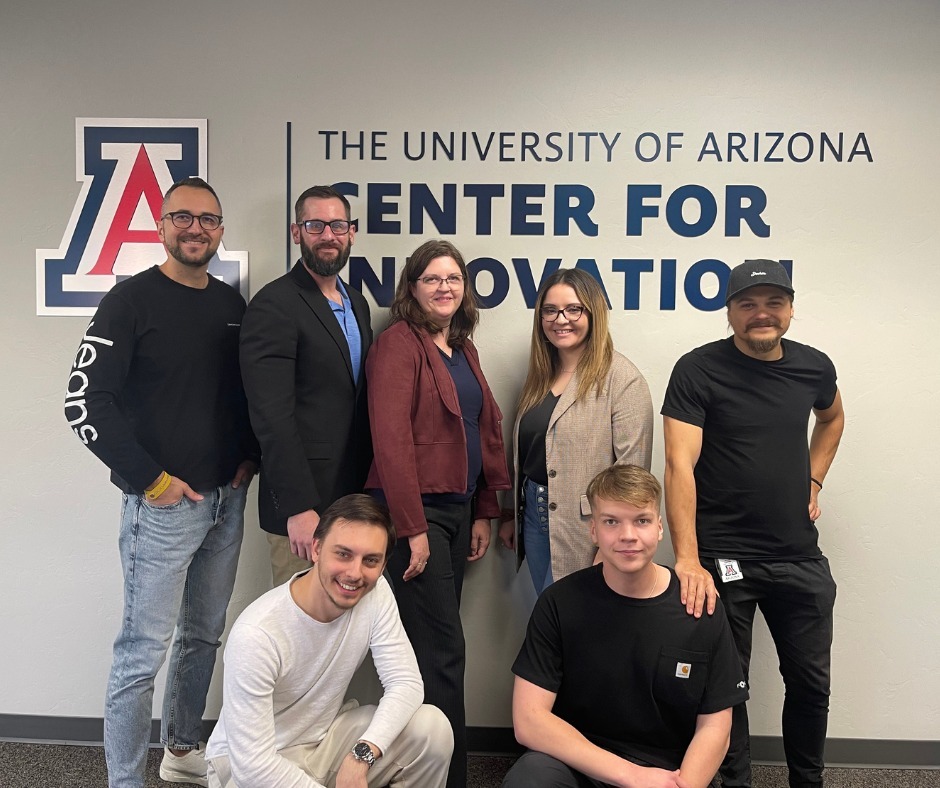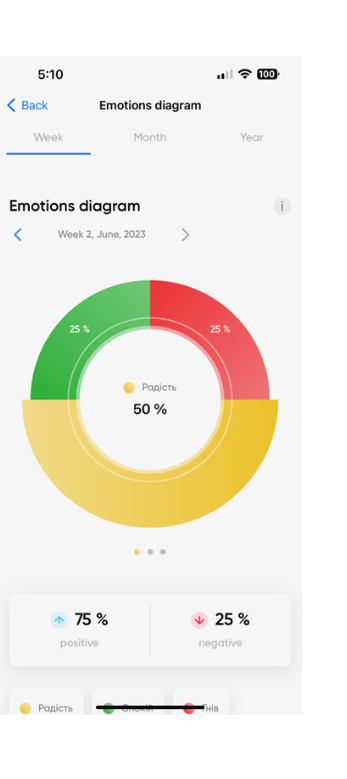
The University of Arizona Center for Innovation hosted four Ukrainian startups at the UA Tech Park on South Rita Road for a six-month entrepreneurship program as part of a U.S. State Department initiative. Standing, from left: Oleg Sheremeta, SorbiForce chief business development officer; Eric Smith, UACI executive director; Anita Bell, UACI director; Casey Carrillo, UACI assistant director; Mykola Zomchak, Noty.ai chief technology officer. Kneeling, from left: Gnat Panok, EQ.APP chief production officer; Yaroslav Samoiliuk, Zeely chief operations officer.
Ukrainian entrepreneur Mykola Zomchak said he and his co-founders at startup Noty.ai knew the United States was going to be a critically important market for its online meeting transcription service.
But Zomchak said they were unsure of how to navigate the American market.
“We knew that we wanted to and would have to enter the U.S. at some point, but we didn’t really know how should we go about it, and what it’s like working there,” he recalled.
After recently completing a six-month entrepreneurial program for international companies at the University of Arizona Center for Innovation, Zomchak and founders of three other participating Ukrainian startups are better prepared to succeed in America and worldwide — and will hopefully contribute to economic recovery of Ukraine at the end of its still-raging war to repel Russia’s 2022 invasion.
Besides Noty.ai, the other Ukrainian startups are EQ Production, developer of an emotional intelligence app; SorbiForce, maker of a sustainable, cost-effective carbon-based battery made from renewable raw materials; and Zeely, a mobile-first web store and ad builder that helps small-business owners start selling online.
The startups were selected through the U.S. Department of State’s Global Innovation through Science and Technology (GIST) initiative to take part in the UACI’s Global Advantage Soft Landings program, which offers business coaching, mentoring and other resources to help international businesses enter the U.S. market.
The startups also receive logistical support from VentureWell, a U.S.-based global nonprofit organization and partner of the GIST initiative.
Founders of the companies went through a custom course from December through the end of May at the UACI, which has been hosting and helping foreign companies since taking over Tech Parks Arizona’s international program in 2019.
All four companies are coached by Carie Davis, an Atlanta-based business consultant and successful entrepreneur who was an executive at the International Business Innovation and spent nearly 13 years at Coca-Cola Co. including a stint as global director of innovation and entrepreneurship.
Coming to America
Zomchak, a software engineer and chief technology officer at Noty.ai, said he was hooked on the idea of creating a software startup a few years ago after attending an event for student entrepreneurs at a university in Lviv, in western Ukraine.
There he met his future business partner, Natalie Marina, a young lawyer who had the idea of developing software tools to allow Ukrainian companies to easily complete legal transactions online.
But there turned out to be a small market for the product, it wasn’t gaining traction, and then the COVID-19 pandemic hit in 2020, Zomchak recalled.
“We decided to take a step back and look at the bigger picture and just to explore, how can we make business video calls more productive in general?” he said.
The result is Noty.ai, an app that not only provides speech-to-text transcription for Google Meet or Zoom virtual meetings, but uses ChatGTP to generate summaries of key meeting points and makes tasks from meeting action items, pre-drafts follow-up emails and allows sharing of transcripts and conversations with colleagues.
“We started to take a look at what kind of problems people have, like not writing the action items and things like that,” Zomchak said. “A lot of people were doing video recordings, which like 99% of the time were not getting used, just wasting money and resources.”
Even before the war in Ukraine began last year, Zomchak and Marina had decided to move to the West, and spent a year in Lisbon, Portugal, working on Noty.ai.
The app launched in December, as the founders began the UACI program and about a year after the company raised $500,000 in a pre-seed funding round.
The company is now looking to raise another $1.5 million in a seed funding round, Zomchak said.
Through the UACI program, Zomchak said he learned U.S. investors want to meet startup founders in person, not via videoconference.
“What I realized from being on this program is that if we want to do business in the United States, then I will I have to have the ability to be present here,” he said.
While Marina is back in Lisbon, Zomchak just finalized his master’s thesis in computer science.
But Zomchak plans to move to Toronto, Canada, since his exchange visitor visa requires him to return to his home country for two years before filing to immigrate to the U.S.
“That’s not really an option for me right now,” Zomchak said of returning to his war-torn home country, adding that he plans stay in Canada on a business visa and make business trips to the U.S. as needed.
Emotional rescue
Gnat Panok, co-founder of EQ Production, went to high school in Florida and was attending Florida International University on an academic scholarship when COVID-19 restrictions shut down the school and he went home to Kyiv.
Panok’s mother, Olga Panok, an author under the pseudonym Sara Bright with a Ph.D. in political science with a background in public relations, became interested in teaching people about emotional intelligence — essentially the ability to identify, understand and manage one’s emotions.
Together with angel investor Andrii Zibran, they decided amid COVID restrictions the best option was to develop an app to help users develop their emotional intelligence to help them move away from negative feelings. They founded EQ Production in 2020.
While there are a number of emotional-help apps already, including Calm, an app promoting meditation and emotional health, EQ’s Emotional Intelligence app teaches people to track their emotions to develop a better understanding of their feelings.
“People can actually open the application and start to change the emotional state, if they have negative emotion, how they transform that into the positive state, track their progress, choose what kind of emotion they’re feeling, and then add all that to their diary so they can track progress day to day, week to week and month to month,” he said.
The EQ app was launched in 2021, it has had 150,000 downloads and has about 15,000 active users — with more than 70% of its user base in the U.S., Panok said.
“When we found out about the (GIST) program, and we were given an opportunity that was like, ‘Hey, there’s like a great half-year program in the United States where you can actually connect with the people who you’re targeting to or you’re selling your product to,’ ” he said. “It just made all the sense in the world.”

A screenshot from EQ,
an app developed by
Ukrainian startup
EQ Production.
Though EQ Production was able to assemble a team including a psychologist and teams of software developers in Ukraine, Panok said through the UACI program the company realized it needed a U.S.-based team to help attract investors and tailor its content to an American audience.
“You have to have your own operation here in the United States, we kind of understood that perception from investors and other companies and potential partners, so that’s our second goal to kind of create our separate team here in the States,” he said.
Better batteries
Another Ukrainian startup at UACI, SorbiForce, has developed a prototype liquid-based battery that uses porous carbon and a non-toxic chemistry to store electrical power.
The battery is made from recycled materials, doesn’t need costly or potentially toxic metals like lithium and cobalt and can be easily neutralized for safe recycling, the company said.

Serhiy Kaminsky, main founder and chief technology officer of SorbiForce, said the UACI helped the company identify potential markets and customers, connect with investors and refine its business strategy for scalability.
“Through UACI, we have gained access to mentorship, resources and networking opportunities, which have played a crucial role in our growth,” Kaminsky said in an email.
Kaminsky said the company is in the process of opening a research and development facility in Fremont, California, and intends to set up a high-tech production facility in Tucson.
While its been difficult for the Ukrainian entrepreneurs to be away from family as the war in Ukraine wears on, Panok and Zomchak said they’ve received a warm welcome in Tucson.
“I have my dad there, I have so many so many friends still there (in Ukraine),” said Panok, whose mother moved from France to Los Angeles a few months ago. “So, praying, hoping that everything is resolved as soon as possible, in the best way for us as possible. That’s the No. 1, you know, goal for us and we’re with them, praying every single day.”
Panok said the Tucson community has been universally supportive.
“I hear all the time that people know about situation in Ukraine and they support us very much and they would like for this (war) to end,” he said. “This just shows that we are really not alone, there are whole countries standing alongside us.”
Panok recalled how at Easter the Ukrainian entrepreneurs were invited to the home of a local businessman whose parents were Ukrainian and was treated to traditional Ukrainian holiday food and family pictures from Ukraine.
“We felt like we were back home during this time, which meant a lot to us, knowing that we’re so far away and there’s a war going on,” he said. “Just to have that feeling of something so familiar, and something we can cherish.”
Continued support
UACI Executive Director Eric Smith said the incubator’s involvement with the Ukrainian companies is the result of a relationship the UA formed with the State Department several years ago.
In 2019, the business incubator hosted four Eastern European startups — two from Belarus and one each from Ukraine and Kosovo — for a four-week crash course in American-style entrepreneurship under the GIST program.
While the UACI member startups typically join for an average of two years of business coaching, its international members can participate in a completely online program, and nine companies are currently doing that, Smith said.
Under the Global Advantage program, foreign companies can come to Tucson as part of a cohort of startups for a four-week program, or a longer program like the Ukrainian startups attended.
Besides the UA, funding and support is provided by local partners including CAID Industries, the law firm Farhang & Medcoff, Cushman & Wakefield PICOR, Tucson Electric Power Co. and Tetakai, which provides manufacturing and technology companies with turnkey solutions to establishing world-class factories in Mexico.
“We provide them with a truncated version of our program and introduce them to the leadership in our community and help them to see that Southern Arizona would be a great landing point for them if they choose — they don’t have to go to New York or Florida or Boston or L.A. or San Diego,” Smith said.
The UACI has an offer of extended support to the four Ukrainian startups for an additional six months, he said.
In 2020, the UACI earned the “Soft Landings” designation from the International Business Innovation Association, as one of 50 entrepreneur organizations to meet the group’s high-level standards for supporting international companies’ operations in the U.S.
Since 2019, UACI has helped 25 international startups from 17 different countries including Australia, Canada, Colombia, Costa Rica, Great Britain, Kosovo, Mexico, Spain, and Ukraine explore U.S. expansion opportunities.
Nine companies have moved here from outside Tucson, including four from other countries.


 TechParksArizona.edu
TechParksArizona.edu
 Apply
Apply
 Stay Connected
Stay Connected
 Login
Login